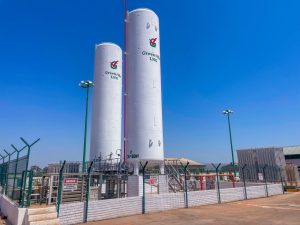Article Type: LCNG

Greenville launches historic L-CNG station in Nigeria
Greenville LNG, a company producing liquefied and compressed natural gas for the Nigerian market, has officially inaugurated the first-ever Liquefied Compressed Natural Gas (L-CNG) station in the country today amidst efforts to boost domestic use of gas as a cleaner and cheaper fuel in Africa’s most populous country. Launched in Nigeria’s Kaduna state, the outlet seeks to transform the transportation landscape through enhanced gas distribution, which in turn curbs fuel shortages. The facility is expected to cater for a wide range of vehicles, including tricycles, buses, and other small vehicles, offering a cleaner and cost-effective alternative to traditional fossil fuels. “Both LNG and L-CNG offer compelling alternatives to traditional fuels, delivering 15-20% fuel cost savings and promoting eco-friendly choice,” Greenville notes in its online channels confirming the launch. “Notably, L-CNG will boost the economy by promoting local business and the transport sector in Kaduna.” As part of efforts to advance clean and cost-effective energy in Nigeria, Greenville says it is establishing 25 L-CNG distribution hubs to provide reliable energy to fuel stations across the country. The company already supplies gas to more than 25 major companies across Nigeria using over 300 LNG powered trucks as part of its innovative virtual pipeline system. Greenville has a network of LNG re-fueling stations strategically located in several parts of the country for LNG fueled trucks, tankers and buses. Founded in 2015, it installed 3 gas liquefaction trains at its Rumuji plant in Rivers state, which it commissioned in 2018. Although Nigeria holds some of the world’s biggest gas reserves estimated at over 200 trillion cubic feet (Tcf), they remain largely underdeveloped, benefiting industrialization and power generation overseas through LNG exports instead. But, boosting local consumption is now at the centre of the government’s agenda as it promotes gas as a transition and cleaner fuel. Boosting local gas consumption with reforms Nigeria’s downstream gas sector has particularly witnessed a raft of reforms since President Bola Tinubu assumed office on May 29 this year, amid push to boost confidence among domestic and international investors looking to do business in Africa’s biggest economy. The subsidy removal on gasoline is notably one of those changes. Cheap petrol prices, which Nigeria spent a fortune subsidising, had made it difficult for motorists to consider an alternative source of fuel such as Compressed Natural Gas (CNG). This also meant a poor investment case for potential investors. But with the subsidy removal levelling out the playing field for all fuels, Nigeria’s transport sector presents tremendous growth opportunities for the CNG and LNG industry. However, while subsidy removal incentivises motorists to go for a cheaper and cleaner fuel in gas, limited investments over the years also mean limited gas infrastructure, which could stifle growth opportunities for Nigeria’s domestic gas market. To bolster the shortfall in critical gas infrastructure, the Nigerian National Petroleum Company (NNPC) partnered earlier this year with NIPCO Gas Limited to deploy CNG stations across the country. The NNPC-NIPCO partnership, signed in August, aims at expanding Nigeria’s CNG infrastructure as it pushes for improved access to CNG, while speeding up the adoption of cheaper and cleaner alternative fuel for private cars and vehicles used for public transport. NIPCO Gas Limited already operates 14 CNG stations across Nigeria, and has converted over 7,000 vehicles to run on CNG, mostly in Benin City. NNPC is betting on NIPCO’s technical expertise and field experience to drive and expand the initiative. The project will be rolled out in phases. The first phase, supporting intra-city transportation, targets 21 CNG stations by Q1 2024. The second phase, to be ready in Q4 2024, will cover 35 CNG stations, servicing inter-city transportation. NNPC plans to bolster the programme with an additional 56 stations through its retail outlets across the country. Once fully operational, the stations can service over 200,000 vehicles daily, the state oil firm said, adding it expects more oil marketing companies from the private sector to participate in expanding CNG penetration and availability in Nigeria.
Read more »